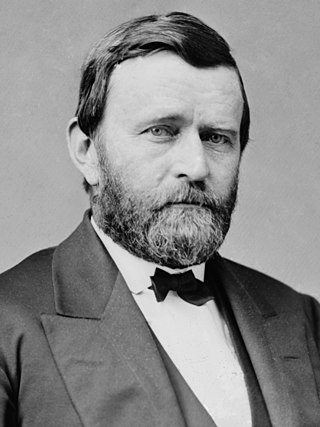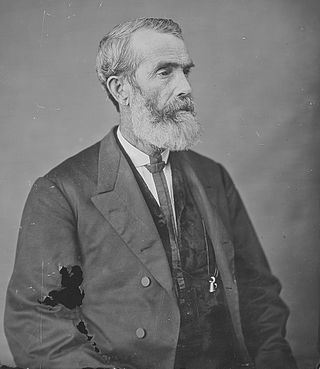
Presidential elections were held in the United States on November 3, 1868. In the first election of the Reconstruction Era, Republican nominee Ulysses S. Grant defeated Horatio Seymour of the Democratic Party. It was the first presidential election to take place after the conclusion of the American Civil War and the abolition of slavery. It was the first election in which African Americans could vote in the reconstructed Southern states, in accordance with the First Reconstruction Act.

William Gannaway "Parson" Brownlow was an American newspaper publisher, Methodist minister, book author, prisoner of war, lecturer, and politician who served as the 17th governor of Tennessee from 1865 to 1869 and as a United States Senator from Tennessee from 1869 to 1875. Brownlow rose to prominence in the late 1830s and early 1840s as editor of the Whig, a polemical newspaper in East Tennessee that promoted Henry Clay and the Whig Party ideals, and also that repeated Brownlow's opposition to secession by the southern slave states in the years leading up to the American Civil War. Brownlow's uncompromising and radical viewpoints made him one of the most divisive figures in Tennessee political history and one of the most controversial Reconstruction Era politicians of the United States.

Dewitt Clinton Senter was an American politician who served as the 18th Governor of Tennessee from 1869 to 1871. He had previously served in the Tennessee House of Representatives (1855–1861), where he opposed secession on the eve of the Civil War. He was elected to the Tennessee Senate following the war, and was chosen as Speaker of the Senate in 1867. As speaker, he became governor upon the resignation of William G. Brownlow in 1869.

Alfred Alexander Taylor was an American politician and lecturer from eastern Tennessee. He served as the 34th governor of Tennessee from 1921 to 1923, one of three Republicans to hold the position from the end of Reconstruction to the latter half of the 20th century. He also served three terms in the U.S. House of Representatives, from 1889 to 1895.

Alvin Hawkins was an American jurist and politician. He served as the 22nd Governor of Tennessee from 1881 to 1883, one of just three Republicans to hold this position from the end of Reconstruction to the latter half of the 20th century. Hawkins was also a judge on the Tennessee Supreme Court in the late 1860s, and was briefly the U.S. consul to Havana, Cuba, in 1868.

Henry Emerson Etheridge was an American politician and a member of the United States House of Representatives for Tennessee's 9th congressional district from 1853 to 1857, and again from 1859 to 1861. He also served one term in the Tennessee House of Representatives (1845–1847) and one term in the Tennessee Senate (1869–1871). After Tennessee seceded in 1861, he was elected Clerk of the United States House of Representatives, serving until 1863.

James Mullins was an American politician who represented Tennessee's 4th congressional district in the United States House of Representatives from 1867 to 1869. He also served a single term in the Tennessee House of Representatives (1865–1867). Described as a "fierce fanatic of the Republican Party," Mullins supported the initiatives of Governor William G. Brownlow in the state legislature, most notably leading efforts to ratify the Fourteenth Amendment.

Roderick Randum Butler was an American politician who represented Tennessee's 1st district in the United States House of Representatives from 1867 to 1875, and again from 1887 to 1889. He also served several terms in the Tennessee state legislature, and briefly served as a state court judge. An opponent of secession, Butler represented Johnson County at the East Tennessee Convention in 1861, and afterward joined the Union Army. Butler was censured by the House of Representatives in March 1870 for receiving payment in return for recommending someone for admission to the U.S. Naval Academy.

Walter Preston Brownlow was an American politician who represented Tennessee's 1st district in the U.S. House of Representatives from 1897 until his death in 1910. He is remembered for obtaining large federal appropriations for his district, as well as for his intraparty political battles with Chattanoogans Henry Clay Evans and Newell Sanders over control of the state Republican Party. Along with his congressional tenure, Brownlow served as Doorkeeper of the United States House of Representatives from 1881 to 1883, and published the Jonesboro Herald and Tribune from 1876 to 1910.

Leonidas Campbell Houk was a lawyer who served in the United States House of Representatives for the 2nd congressional district of Tennessee. Between 1878 and 1891, Houk was elected to seven consecutive terms in the House, during which time he helped solidify the Republican congressional dominance in East Tennessee that remains to the present day. Houk fought for the Union Army during the Civil War, and rose to the rank of colonel within a few months. Largely self-trained as a lawyer, Houk served as a state circuit court judge from 1866 to 1869.

Richard Wilson Austin was an American politician, attorney and diplomat. A Republican, he served in the United States House of Representatives from 1909 to 1919, representing Tennessee's 2nd district. Prior to his congressional tenure, he worked as a United States Marshal from 1897 to 1906, and served as the U.S. consul to Glasgow, Scotland, from 1906 to 1907.

The Republican Party of Florida (RPOF) is the affiliate of the Republican Party in the U.S. state of Florida. It is currently the state's dominant party, controlling 20 out of 28 of Florida's U.S. House seats, both U.S. Senate seats, the governorship and all other statewide offices, and has supermajorities in both houses of the state legislature.

Joseph Alexander Cooper was an American farmer, soldier, and civil servant. A Southern Unionist, he fought for the Union Army during the American Civil War, commanding units at Mill Springs, Stones River, Chickamauga, Franklin, Nashville, Bentonville, and in the Knoxville and Atlanta campaigns. He had achieved the rank of Brevet Major General by the time he was mustered out in early 1866.

The East Tennessee Convention was an assembly of Southern Unionist delegates primarily from East Tennessee that met on three occasions during the Civil War. The convention most notably declared the secessionist actions taken by the Tennessee state government on the eve of the war unconstitutional, and requested that East Tennessee, where Union support remained strong, be allowed to form a separate state that would remain part of the United States split from the rest of Confederate Tennessee. The state legislature denied this request, and the Confederate Army occupied the region in late 1861.

The 1970 Connecticut gubernatorial election was held on November 3, 1970 in the U.S. state of Connecticut.
Charles Inman was an American politician, soldier and farmer, who served two terms in the Tennessee House of Representatives, from 1865 to 1869. A Radical Republican, he typically supported the initiatives of Tennessee's postwar governor, William G. Brownlow. He voted in favor of the ratification of the Fourteenth Amendment, and supported legislation punishing former Confederates.
John Miller Fleming was an American newspaper editor, attorney and politician, active primarily in Tennessee during the latter half of the 19th century. He rose to prominence as editor of the Knoxville Register in the late 1850s, and worked as the editor of various newspapers, including the Knoxville Press and Herald, the Knoxville Tribune, and the Knoxville Sentinel, in the decades following the Civil War. He also served two terms in the Tennessee House of Representatives, and was appointed Tennessee's first Superintendent of Public Instruction in 1873.

The 1970 Tennessee gubernatorial election was held on November 3, 1970, to elect the next governor of Tennessee. Incumbent Democratic governor Buford Ellington was term-limited and was prohibited by the Constitution of Tennessee from seeking another term. Republican nominee Winfield Dunn, defeated Democratic opponent John Jay Hooker with 52.0% of the vote.

The 1968 Indiana gubernatorial election was held on November 5, 1968.

The 1869 Tennessee gubernatorial election was held on August 5, 1869, to elect the next governor of Tennessee. Incumbent Republican governor Parson Brownlow was elected to the United States Senate and resigned as governor on February 25, 1869. Republican Dewitt Clinton Senter, being the speaker of the Tennessee Senate, became governor following Brownlow's resignation.




















